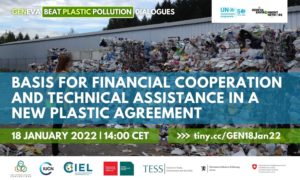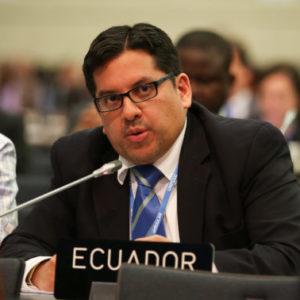Event Virtual
Basis for Financial Cooperation and Technical Assistance in a New Plastic Agreement | Geneva Beat Plastic Pollution Dialogues

The Geneva Beat Plastic Pollution Dialogues aim to facilitate further engagement and discussion among the stakeholders in International Geneva and beyond. In addition, they intend to address the plastic crisis and support coordinated approaches that can lead to more efficient decision making. Ahead of the second segment of the 5th UN Environment Assembly (UNEA-5.2), this session focused on the potential mechanisms for financial cooperation and technical assistance which could be included in a new global legally-binding agreement on plastic pollution.
About the Dialogues
The world is facing a plastic crisis, the status quo is not an option. Plastic pollution is a serious issue of global concern which requires an urgent and international response involving all relevant actors at different levels. Many initiatives, projects and governance responses and options have been developed to tackle this major environmental problem, but we are still unable to cope with the amount of plastic we generate. In addition, there is a lack of coordination which can better lead to a more effective and efficient response.
Various actors in Geneva are engaged in rethinking the way we manufacture, use, trade and manage plastics. The Geneva Beat Plastic Pollution Dialogues aim at outreaching and creating synergies among these actors, highlighting efforts made by intergovernmental organizations, governments, businesses, the scientific community, civil society and individuals in the hope of informing and creating synergies and coordinated actions. The dialogues highlight what the different stakeholders have achieved at all levels, present the latest research and governance options. In addition, the dialogues encourage increased engagement of the Geneva community in the run-up to various global environmental negotiations, including UNEA-5 in February 2021 and February 2022.
Building on the outcomes of the first series of dialogues and the recent policy developments, the Geneva Environment Network is hosting a second series of events to facilitate further engagement and synergies on tackling the plastic crisis. These events are held in collaboration the Basel, Rotterdam and Stockholm Conventions Secretariat, the Center for International Environmental Law, the Global Governance Centre at the Graduate Institute, IUCN, Norway, Switzerland, and the Forum on Trade, Environment & the SDGs (TESS).
About this Session
Plastic is an issue of global concern. As such, it requires global cooperation and responses. After several years of discussions under the auspices of the United Nations Environment Assembly, many governments, businesses, civil society organizations and academic institutions are now calling for the establishment of a global legally-binding instrument to address the risks posed by plastic throughout its lifecycle. At the Ministerial Conference on Marine Litter and Plastic Pollution, convened by Germany, Ecuador, Ghana and Vietnam in Geneva on 1-2 September 2021, Peru and Rwanda presented a first draft of a UN resolution to pave the way for a binding agreement on marine litter. The draft resolution is now co-sponsored by 41 countries from all UN regions. Recently, the Japanese Government also put forward its own version of a draft resolution (which is not yet co-sponsored). If interested in the substance of these two resolutions, you can use this table which was prepared to that effect.
The draft resolutions are intended to serve as the formal basis for the adoption of a negotiating mandate for an Intergovernmental Negotiating Committee to start of negotiations on a global agreement at the 5th UN Environment Assembly (UNEA-5.2) in February 2022.
However, plastic pollution varies greatly from one country to the next, both in terms of scale and impacts of plastic pollution, as well as their financial and technical capacity to address these. Therefore, any new global instrument requires carefully designed mechanisms that can effectively address these challenges. In particular, technical and financial resources will be needed to support decision-making and assist developing countries and economies in transition to implement the global responses that will be negotiated to address the plastic crisis.
During this session, leading experts discussed these challenges and provide recommendations on setting up robust financial cooperation and technical assistance mechanisms within a new UN agreement on plastic pollution.
Speakers

Walter SCHULDT
Director, Environment and Sustainable Development, Ministry of Foreign Affairs and Human Mobility, Ecuador

Timothy GRABIEL
Senior Lawyer, Environmental Investigation Agency

Delphine ARRI
PROBLUE Manager for Marine Pollution, Senior Environmental Engineer - Environment, Natural Resources & Blue Economy Global Practice

Jost DITTKRIST
Programme Officer, Secretariat of the Basel, Rotterdam and Stockholm Conventions

Vito A. BUONSANTE
Policy & Technical Advisor, International Pollutants Elimination Network (IPEN)

Peggy LEFORT
Resource Efficiency Coordinator, UNEP FI

Carsten WACHHOLZ
Senior Policy Manager, Institutions, Governments, and Cities, Ellen MacArthur Foundation

David AZOULAY (Moderator)
Managing Attorney, CIEL Geneva Office | Director of Environmental Health Program, CIEL
Summary
Welcome and Introduction
Broader context and objectives of the session | David AZOULAY | Managing Attorney, CIEL Geneva Office | Director of Environmental Health Program, CIEL
The global community’s attention to the plastic problem has been rising along the past decade, including in the context of the UN Environment Assembly. As discussions progressed, it became clear that the existing global policy framework was too fragmented and was insufficient to adequately address the issue of plastic pollution. More than 120 countries have now expressed their support to the development of a global response to the plastic crisis, with instruments suggested ranging from voluntary instruments focused on the marine environment to legally binding instruments encompassing the whole lifecycle of plastics.
Two resolutions have been put forward to the upcoming UN Environment Assembly : UNEA-5.2 in February 2022. This first one, which has been put forward by Peru and Rwanda and is currently co-sponsored by 42 countries, insist on a broad legally binding framework that covers the entire life-cycle of plastics. The second one, proposed by Japan, focuses on the marine environment specifically. More details on the differences between these two resolution can be found in the comparison table published by CIEL and EIA.
Now that it is expected that the upcoming UNEA meeting will adopt a mandate for negotiations, it is time to discuss what this treaty would look like and the key components for its success. Similarly to other instruments in the global environment arena, the question of funding and technical support is central. How can countries bring together the technical expertise and the financial resources that will allow them to effectively implement the legal obligations that will stem from the new agreement? The panel today shall provide some light into this question.
Opening Statement
A New Plastic Agreement | Walter SCHULDT | Director, Environment and Sustainable Development, Ministry of Foreign Affairs and Human Mobility, Ecuador
Despite all the challenges the past years have brought us with the pandemic and its economic consequences, there is now a steady increase in the level of political will from governments and other stakeholders to address comprehensively the threats and impacts of marine litter and plastic pollution. The impacts on the environment and biodiversity, but also health, economies, tourism, trade, sustainable development at large and human rights, are increasingly recognized.
As part of the efforts to foster this political will, Ecuador, Germany, Ghana and Vietnam hosted the first Ministerial Conference on Marine Litter and Plastic Pollution in Geneva in September 2021. Thanks to this conference and its inclusive preparatory process, key elements of what a future agreement could be were identified, including regarding the scope of the agreement, the common objectives and goals, the concrete commitments to reduce and phase out plastic pollution, and the means of implementation. On that last point, it is essential to ensure that all countries, including developing countries, are able to implement the provisions of the agreement. Other important aspects discussed including the need for solid data and indicators and the importance of compatibility and collaboration with existing instruments. The conference resulted in the adoption of a Ministeral statement to build momentum and deliver a clear message toward UNEA-5.2, which gathered the support of 75 countries.
These discussions highlighted the need to include a financial mechanism to support developing countries, in particular SIDS and LDCs, to fulfill their obligations. This would include support to develop national actions plans with incentives to promote circular economy. Such support could be provided where they achieve the highest return on investment, for example targeting upstream measures and preventive action to reduce the generation of plastic waste such as providing incentives for industries to use more recycled materials and make plastics more recyclable.
Other suggestions highlights the importance of innovative finance mechanisms to attract private sector investment, including scaling up risk investment. Extended producer responsibility schemes would also provide tools to ensure funding from the private sector according to the polluter-pays principle. Another tool that could be used is matching mechanisms (mechanisms and bodies which can be used as repositories of opportunities, initiatives and providing support in the form of capacity-building, learning-opportunities and best practices exchanges), as well as a potential scientific and technical body to develop standards and guidelines. Examples of such bodies exist within the UNFCCC.
A specific funding mechanism has also been suggested, whether a global fund or a dedicated wing in an existing mechanism such as the GEF. For this element, we should learn from previous experiences of the GEF and the GCF to avoid such delay in getting the proper appropriation and ensure efficient delivery of the funds. Finally, it has been suggested that the international negotiating committee includes a mandate to coordinate support for stable and predictable funding directed to actors with significant plastic footprints and vulnerable communities. Taking a gender and human-rights based approach was also mentioned.
The barriers faced by some countries to access funding and for technology transfer were also recognized in discussed ahead of the Ministerial Conference. These barriers include the small participation of private funds, the limited attention from donors to sectors with significant plastic footprints, the absence of a specific focus on gender, the limited resources available in some languages, the differences in technologies and standards between countries and regions, the lack of data comparability, the absence of case studies in some regions, and the lack of indigenous people and local community based initiatives.
In conclusion, we need to learn from lessons from UNFCCC, CBD, BRS, and other international agreement in order to move forward quickly, avoid mistakes and repeat the good examples.
Basis for Financial Cooperation and Technical Assistance in a New Plastic Agreement
Timothy GRABIEL | Senior Lawyer, Environmental Investigation Agency
Financial support to address plastic pollution is already flowing. Many countries have been giving overseas development aid for several years for the purpose of reducing marine litter and plastic waste. While this existing financial landscape does not lack financial resources per se, it lacks structure and coordination toward the achievement of clear objectives.
On the donor countries’ side, coordination is lacking in bilateral funding strategies or with project funding at the national level, creating a sort of patchwork approach. Moreover, donors pay limited attention to sectors with significant plastic footprints and impacts, such as textiles and agriculture, and certain areas, including gender issues, the informal sector and indigenous people. Recipient countries, on the other side, experience challenges accessing existing funding, as windows are multiple, and difficulties in coordinating with national budgets and plans.
Establishing a convention to address global plastic pollution would require financial resources for two purpose. First, resources are needed for the day-to-day operations of a secretariat. Examples of approved 2020 budgets (in million USD) for various secretariats are: Ozone 5.3; Basel 4.8; Minamata 3, UNFCCC 30. Typically, these contributions are distributed among Parties based on their capacity to pay.
Secondly, financial support is needed to help developing countries meet their commitment. This includes enabling activities – such as capacity building, institutional strengthening, policy development, monitoring and reporting or pilot projects – and incremental costs of compliance. These costs are often covered by a fund.
Various financial mechanisms exist to deliver this support. The choice of financial mechanism is fundamental to the success of the new global plastics treaty. Secretariats are typically financed through general trust funds. A multi-purpose multilateral fund caters to several conventions; the GEF is an example of such fund. Meanwhile, a dedicated multilateral fund is tailored and design to respond to the objectives of a specific convention; an example is the fund under the Montreal Protocol. This type of fund can be very successful, and it could be advanced within the context of a new convention on plastics.
Delphine ARRI | PROBLUE Manager for Marine Pollution, Senior Environmental Engineer – Environment, Natural Resources & Blue Economy Global Practice
The World Bank Group and the PROBLUE programme in particular, stand ready to continue supporting countries and the private sector in their efforts to address marine litter and plastic pollution. PROBLUE is a multi-donor trust fund, which was established in 2018 and has now 16 donor countries involved. Since its creation, PROBLUE has contributed with more than 35 million USD in analytics and technical assistance to countries and at the regional level. As a whole, the World Bank’s portfolio of activities on marine litter and plastic pollution exceeds 5 billion USD.
Solutions to the plastic problem should include actions to prevent leakage by improving solid waste management and river basin management, to foster a circular economy, and to restore polluted ecosystems. As countries implement their stimulus and recovery plans, there is a big opportunity to build back in a more sustainable way while addressing the drivers of plastic pollution and shifting away from our current throw-away mode of consumption and production. PROBLUE follows this approach and is thus a useful tool for financing these needed changes.
While solid waste management is a priority, circular economy is the long-term solution. Currently, only 9% of plastics are being recycled globally. Analytics from Thailand, Malaysia and the Philippines show that the untapped market for some resins represent a loss to the economy of 6 billion USD per year. This means private sector investments and jobs are lost along the way. Therefore, we need to ramp up the financing and create the incentive for the private sector to invest in circular economy.
Governments have a key role to play as enablers by enacting and implementing the legal and regulatory framework that break down barriers to investments in circular economy. PROBLUE is working in several countries to assess plastic value chains and identifying the barriers to private sector investment in new materials, sustainable packaging, and the recycling market.
PROBLUE works on demand from countries, sometimes jointly with IFC, to provide analytics and technical assistance to assess the magnitude of the problem, identify entry points, and provide the roadmaps and action plans that countries need to implement their programme. Building back greener and bluer gives new impetus to drive policy changes that create a sustainable future. It is an opportunity to create jobs and improve livelihoods. In addition to the usual instruments that the World Bank can provide to countries, PROBLUE can continue supporting countries as the UN processes unfold.
Jost DITTKRIST | Programme Officer, Basel, Rotterdam and Stockholm Conventions
The experience of the Basel, Rotterdam and Stockholm Conventions and their finance mechanisms can provide useful insights for the development of a new instrument. Each of the convention operates under a general trust fund and a special trust fund for voluntary contributions. Technical assistance and capacity development is included in those funds; in 2020-2021 it accounted for approximatively 12% of the total budget. The Basel Convention further has an implementation fund which helps to cover costs associated with the implementation of compliance action plan by specific governments. The Stockholm Convention also receives financing through the Global Environment Facility (GEF). A review of the finance mechanisms noted that, although the GEF has responded adequately to COP decisions, resources for POPs in the GEF have not been commensurate with the evolution of the Convention.
The BRS Conventions also benefit from the Special Programme to support institutional strengthening, which also supports the Minamata Convention and SAICM. Even more overarching is the integrated approach to financing of the sound management of chemicals and waste, which provides a relevant framework also outside of BRS. It advocates for mainstreaming, industry involvement and external financing as key pillars.
Parties to the conventions are supported through a variety of technical assistance and capacity development activities, thanks to the contribution of several countries and a few private donors. Another crucial means to support parties in implementing the conventions are partnership. For example, the Basel Convention Plastic Waste Partnership plays a critical role in mobilizing multi-stakeholders action, bringing together businesses, government, academic, and civil society. Under both the Basel and Stockholm Conventions, the regional centres provide another tool for training and technology transfer. They provide crucial technical assistance and other support to parties all over the world through their regional networks, including in the context of the small grant programme.
All-in-all, there are various ways in which parties can be supported, whether through technical assistance projects, partnerships, training and technology transfer, etc. The tools, channels and venues that we can use are multiple. Finally, the integrated approach to financing remains valuable, as dedicated external financing, mainstreaming and industry involvement are all still needed.
Vito A. BUONSANTE | Policy & Technical Advisor, International Pollutants Elimination Network (IPEN)
IPEN is a network of organizations based in 124 countries all over the globe, bringing local concerns to international conventions. IPEN’s work highlights the toxic impacts of plastics throughout their life cycle. Thus, IPEN absolutely supports the idea of a plastics treaty, especially one that would include the entire life cycle of plastics. This is important in the context of the exponential increase of both plastic production and chemicals production, both markets being intrinsically related.
There are a few crucial elements to the establishment of a plastics treaty. Such an agreement should include the whole lifecycle of plastics: a focus on waste management only may lead to a treaty where the financing of the plastics’ public liability would be mainly public. Currently, financing to address pollution issues through multilateral agreement is insufficient; therefore, we need to think of innovative and creative ways of financing if we are to establish a new agreement.
Referring to article 16 of the Rio Declaration, IPEN and CIEL proposed one innovative solution, which is to make the polluters pay. The report was written in the context of the financing of the sound management of chemicals which is chronically underfunded, but the concept can also be easily applied to the plastic supply chain. The idea is to develop an internationally coordinated tax on basic chemicals sales, many of which are often used in plastics. A 0.5% tax on these sales could generate 11 billion USD in public funds, which would be enough to fund existing conventions and a new one on plastics.
If we restrain ourselves to traditional ways of funding, a new plastics treaty might take away resources from existing treaty, due to its public visibility. We need to find new money to fund a new treaty. Thus, mainstreaming and having more industry involvement in the financing is crucial to address the externalities that this industry is causing.
Carsten WACHHOLZ | Senior Policy Manager, Institutions, Governments, and Cities, Ellen MacArthur Foundation
The New Plastics Economy Global Commitment is a voluntary initiative led by the Ellen MacArthur Foundation in collaboration with UNEP. Its approach looks at a comprehensive and holistic transition toward a circular economy for plastics. There are now about 1000 organizations across the whole plastic value chain united behind one common vision.
Under this initiative, companies representing around 20% of all plastics packaging produced globally, have committed to ambitious targets to help realize that common vision. This vision is substantiated by common definitions, harmonized metrics and clear reporting guidelines. These help companies to eliminate unnecessary and problematic plastics, implement reusable business models where possible, deliver on packaging solutions that are 100% reusable, recycling or compostable in practice and at scale, and decouple plastic use from the consumption of finite resources. Through the global commitment process, these companies commit to report their packaging data and the progress they made toward their 2025 targets. Thanks to the common definition and metrics, this data can be compared, and sectoral insights can be drawn from aggregate data.
Under the UN Principles for Responsible Investment, a specific working group initiated a project to develop guidance for investors engaging with companies in the plastics packaging value chain. In that context, we provided inputs based on the shared approach that we have developed under the New Plastics Economy Global Commitment. While these are not the only definitions and metrics that should inform financial cooperation and technical assistance under a future UN plastics treaty, ensuring consistency in what public and private funding aims to achieve will be key.
Another useful approach that we are currently contributing to is the work of the EU Sustainable Finance Platform, notable the EU Sustainable Finance Taxonomy. This classification system establishes a list of environmentally sustainable activities and it could play an important role in helping the EU scale up sustainable investment and implement the goals of the EU Green Deals. It should provide certainty for investors, protect finance from greenwashing and help companies become for environmentally friendly, mitigate regulatory market fragmentation and help shift investments where they are most needed.
Assuming that the new plastics treaty will address a range of environmental, social, and economic issues and will not narrowly focus on preventing plastic leakage into the environment, the work on sustainable finance taxonomy could be a useful reference to establish a sound mechanism for finance cooperation and technical assistance. This work should not only involve political discussions; at the technical level, criteria are being developed to ensure that the activities included in the taxonomy contribute to at least one environmental objective and do not harm to the others.
To conclude, the business case for a UN plastics treaty is clear, as shown in a joint report with WWF and the Boston Consulting Group. Setting out global goals and binding targets require common definition and consistent measurements if we really want to harmonize policy efforts, enhance investment planning, stimulate innovation and infrastructure development. While voluntary initiatives can deliver change among market leaders, an internationally binding approach is needed to deliver the necessary change at industry scale. More than 70 companies and financial institutions have launched a joint statement ahead of UNEA-5.2 to urge UN member states to establish a negotiating committee to develop an ambitious international legally binding instrument on plastic pollution.
Peggy LEFORT | Resource Efficiency Coordinator, UNEP FI
UNEP Finance Initiative (UNEP FI) is a partnership between the United Nations and the global finance sector, which collaboration with banks, insurers and investors aims at steering financial action to the service of people and nature. UNEP FI is responsible for co-developing principles and norms for sustainable finance, as well as representing a point of reference for financial institutions in their journey to sustainability. Furthermore, the organisation works to increase public-private sector collaborations as a channel to foster change, as exemplified by the TNFD (Taskforce on Nature-related Financial Disclosures).
In the past couple of years, UNEP FI has actively contributed to tackling the plastic pollution issue through the development of three major initiatives. The first concerns the insurance industry and is showcased in the Unwrapping the Risks of Plastic Pollution to the Insurance Industry report. Demonstrating that plastic pollution risks are undermining the insurance industry’s core function of underwriting and managing risks on top of physical, reputation, transitional and liability risks, the report provides explanations and recommendations on how the insurance industry can address these risks. Additional research on this relationship is currently being produced through a study on environmental liability risks for insurers.
The second relevant initiative is UNEP FI’s Sustainable Blue Finance Initiative, a collaboration with the European Commission, WWF, the World Resources Institute and the European Investment Bank to produce s series of principles for financing a sustainable blue economy. On the blueprint of these principles, the collaboration between UNEP FI and financial institutions resulted in the production of a practical guide for financial institutions titled Turning the Tide: How to Finance a Sustainable Ocean Recovery. This work is now being complemented by the second volume of practical criteria and recommendations on specific activities in some key oceans sectors, including solid waste like plastic, financial sectors should upstream or downstream.
The last initiative regards target settings for banks, an initiative borne out of the stimulus of the Demystifying Finance for Circular Economy report, which led to the development of practical guidelines for banks to set their baseline and set targets on resource efficiency and circular economy. Despite not being plastic-specific, the lessons learned from this initiative are eventually useful for steering the financial sector’s action to curb plastic pollution. Among these, adopting a holistic approach reveals to be one of the major challenges for the financial sector as the endorsement of new and circular business models requires loads of innovation energy. Again, the challenges encountered in this initiative demonstrate that plastic pollution is a multi-stakeholder problem, requiring coordination and collaboration, blended finance and innovative financial mechanisms. Lastly, these factors stress the fundamental role of the financial world in making more sustainable investment decisions and engaging with clients and investees for the future of plastic pollution. For these to happen, the major challenge the financial sector faces is setting a framework, as setting targets is essential to drive action. Thus, fighting plastic pollution from the financial side still needs to identify these targets, evidencing the need for a global and ambitious treaty on plastic pollution.
Open Discussion
Q : Does Ellen MacArthur Foundation also work with European Financial Reporting Advisory Group on the upcoming Corporate Sustainability Reporting Directive?
Carsten WACHHOLZ: Aside from the EU taxonomy of economic activities, the EU aims to standardize reporting for medium and large size companies on sustainability, also known financial reporting. The Ellen MacArthur Foundation is supporting this process by providing expert input on how these reporting systems can be aligned and harmonized from a circular economy perspective. Still, at this stage, only the taxonomy part has reached the level necessary to look at specific processes and within-sectors specific activities, whereas the corporate reporting standards process part will require a couple of years to achieve the sector-specific level of granularity necessary to learn what we need to contribute to circular economy solutions for plastics.
Q : How much money would be needed for a successful treaty compared with how much is likely to be raised by different potential funding mechanisms?
Delphine ARRI: The estimate of the needs are in billions and the availability of sponsors varies from country to country. This stresses the importance of having financing from different sources, such as blended finance, public and private sources. Financial support should not come from a single country or an institution, rather from a collaboration and coordination, which still requires to be put in place.
Jost DITTKRIST: The financial estimate is tied to the scope of the potential agreement, making current answers partially realistic. Good functioning incentives mechanisms are a way to provide financial support to those receive funds to use them for the advancement of the convention.
Carsten WACHHOLZ: The challenges to a global financial estimate come from the differences of countries’ features, but there are positive achievements in terms of plastic waste management where more accurate financial assessments are possible (30 million USD dollars). As we need to have plural entities inputting this money sum, it is essential to have a regulatory mechanism – possibly put in place by the treaty – like extended producers responsibility schemes to mobilize funds from plastic producers.
Walter SCHULDT: Rather than prioritizing exact figures, it is important to ensure the predictability and the efficiency of those funds. Learning from the experiences of figures bargaining witnessed at COP26 and in other fora, for us is still preferable to start by setting targets reflective on needs and then decide how much is necessary to achieve them and the willingness to mobilize these.
David AZOULAY: The value of the treaty to set targets and address needs is of outmost importance. It is also necessary to consider capacity-building needs and implementing costs as treaties and conventions evolve, more obligations, approaches and solutions can be adopted. These instruments should be enforced with a degree of flexibility that enables all countries to thrive from these initiatives. An additional point to reflect on are virtuous circles resulting from obligations: these not only provide financial incentives, but they also represent cost-saving mechanisms as inaction at this point is a greater fiscal burden compared to obligations’ costs.
Vito A. BUONSANTE: While making a realistic assessment of the financial needs is difficult,it also is very challenging to negotiate the priorities for a treaty on the basis of estimated financial needs. Therefore, we must be cautious not to negotiate the treaty based on the available money but rather negotiate based on the actual needs and then discuss the financing side.
Closing Remarks
Walter SCHULDT: It is fundamental that all the participants take into account the need to continue fostering the political will as it is much needed as UNEA approaches. There is a clear need for financial cooperation and yet the available provisions are sometimes still in the shape of undetailed frameworks or absent. If there is an actual will to present a comprehensive framework to address plastic pollution, this should be quickly addressed to be ready to provide all inputs and opportunities presented today when we sit at the negotiation table.
Timothy GRABIEL: Some key questions regarding financing mechanisms still need to be reflected upon. How can we best promote the objectives of the agreement? How to ensure to have stable and predictable funding to recipient countries? How best are we able to align with the aims of the governing bodies? How do we ensure that there is adequate and developed expertise within the secretariat of the fund so that they can give out the many in the most effective manner and work with the government? How can we ensure that both donors and recipient countries have a say on how the money is dispersed? These questions are what we need to focus on if we really wish to bring this treaty to a higher level and ensure its achievements of goals and its sustainability. Moreover, waste management in recipient countries will not be indefinitely financed by donors. This raises the imperative of thinking creatively about how waste can be managed directly from polluters.
Delphine ARRI: One take away from today is that we need collaboration between different initiatives, UN institutions, banks and so on. This reinforces the World Bank’s efforts to sustain the private and public sector and ensure their coordination since more financing is clearly needed. Another important message is that all this financing must come all along the life cycle, including reforms and policies addressing the upstream. Financing only waste management is a short-term solution that will aggravate the issue in the future. There is a need to anticipate and to really go beyond waste management, and to keep a balance in the financing – wherever is coming from – into all the solutions and creating market incentives, upstream for the reuse, remanufacturing, repair and design for these to be reused, repaired and remanufactured.
Jost DITTKRIST: Coming back to the integrated approach, the first step is dedicated external financing. This is crucial for any future agreement. Without dedicated financing we cannot expect developing countries to implement a convention. Industry involvement is equally necessary for the implementation of a plastic treaty. Finally, an essential but overlooked aspect is mainstreaming both for donors and recipient countries to ensure even dissemination of knowledge and associated solutions.
Vito A. BUONSANTE: Unfortunately, in the last 30 years the principle of polluters pay has not been implemented. We need to make sure that the polluters do not benefit from the pollution they cause through the external financing of waste management. This needs a lot of work but it is a pressing priority to address.
Carsten WACHHOLZ: We must not wait until the signing of a treaty to focus on upstream and lifecycle economy approaches. Every financial cooperation mechanism must be based on a common framework, based on harmonized standards and definitions applicable to most processes while remaining flexible to specific features. If we wish for the policy, financial and technical sides to effectively interact, the framework, the baseline, the targets must first be established at the global level to avoid fragmented solutions for plastic pollution.
Peggy LEFORT: The most important step to take is setting a common vision grounded in circular economy and a common goal to reduce the production of virgin plastics, addressing the problem at its source. It is also key to define a robust monitoring and reporting mechanism and work with harmonized metrics and standards. Today the topic of data collection was not touched, but it is a stepping stone to understand the baseline and what to address first. Furthermore, efforts must be made to develop enabling activities, bring science, innovation, and technical assistance to the financial sector, and foster the collaboration and cooperation between public and private finance sectors. Lastly, making a connection between plastic pollution and climate change is of utmost urgency as the latter represents the top priority for all the finance world.
Video
In addition to the live WebEx and Facebook transmissions, the video is available on this webpage.
Documents
Links
- Plastics and the Environment | Regularly updated resource page by the Geneva Environment Network
- Draft Resolution on Plastic Pollution to UNEA 5.2 | Peru & Rwanda
- EIA’s work on plastic pollution & on a new plastics treaty
- PROBLUE: The World Bank’s Blue Economy Program
- IPEN’s Toxic Plastics Campaign
- Business Statement for a Legally Binding UN Treaty on Plastic Pollution
- The Global Commitment 2021 Progress Report | UNEP & Ellen MacArthur Foundation | 16 November 2021
- Building Momentum for a Treaty on Plastics | CIEL Annual Report | November 2021
- A New UN Treaty to Adress Plastic Pollution | Ellen MacArthur Foundation | August 2021
- A binding global agreement to address the life cycle of plastics | Nils Simon, Karen Raubenheimer, Niko Urho, Sebastian Unger, David Azoulay, Trisia Farrelly, Joao Sousa, Harro van Asselt, Giulia Carlini, Christian Sekomo, Maro Luisa Schulte, Per-Olof Busch, Nicole Wienrich, Laura Weiand | Science | 2 July 2021
- Global treaty to regulate plastic pollution gains momentum | National Geographic | 8 June 2021
- Turning the Tide: How to finance a sustainable ocean recovery | UNEP FI | March 2021
- Financing the Sound Management of Chemicals Beyond 2020: Options for a Coordinated Tax | CIEL & IPEN | September 2020
- Convention on Plastic Pollution: Toward a New Global Agreement to Address Plastic Pollution | CIEL, Environmental Investigation Agency, GAIA, and #breakfreefromplastic | June 2020
- Unwrapping the Risks of Plastic Pollution to the Insurance Industry | UNEP FI | November 2019
